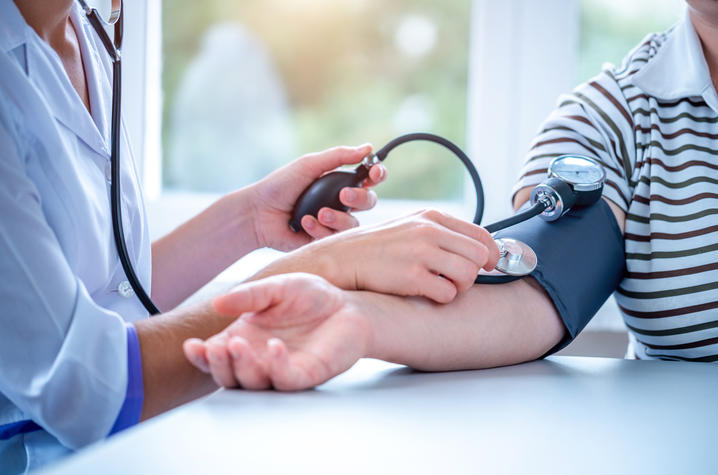Hypertension is a leading cause of chronic kidney disease

The University of Kentucky Public Relations and Strategic Communications Office provides a weekly health column available for use and reprint by news media. This week’s column is by Makayla Nelson, Pharm. D., and Katherine Donaldson, M.D., with UK HealthCare Nephrology, Bone and Mineral Metabolism.
LEXINGTON, Ky. (April 21, 2025) — Almost half of adults in America — about 108 million people — have hypertension. Hypertension, which is also known as high blood pressure, can constrict and narrow the blood vessels in important organs such as the heart and kidneys, causing long-lasting damage. It is one of the leading causes of chronic kidney disease.
Our kidneys are essential for removing waste and extra fluid from the body. When uncontrolled high blood pressure causes the blood vessels in the kidneys to constrict, this reduces blood flow and stops the kidneys from working properly. Extra fluid can raise blood pressure levels even more, creating a dangerous cycle that can lead to kidney failure.
Understand your blood pressure reading
Blood pressure is the force of blood pushing against the walls of your arteries as your heart pumps blood though your body, this is measured in millimeters of mercury (mm Hg). A blood pressure reading includes two numbers. A normal reading is when your top number (systolic) is less than 120 and your bottom number (diastolic) is less than 80.
Systolic blood pressure in the range of 120-129 are considered elevated. Hypertension is officially diagnosed when the average systolic is 130 or higher and/or the diastolic is 80 or higher. If your systolic reaches 180 or higher, or your diastolic is over 120, it may indicate a hypertensive crisis, and you should seek medical attention right away.
Take action to lower your blood pressure and protect your kidneys. Caring for your kidneys is crucial to prevent long-term damage to the rest of your body. Below are some recommendations from physicians that you can put into practice to help control blood pressure and reduce the need for medications or lower the number of drugs that are needed to control blood pressure.
Develop healthy habits
Regular physical activity can lower blood pressure and reduce the risk of hypertension. Experts recommend at least 150 minutes of physical activity per week of moderate intensity, aerobic activity like biking, swimming or even walking. Any activity is better than no activity.
Losing weight can also lower your chances of developing health problems related to high blood pressure. If you are diagnosed with obesity or are overweight, reducing your body weight 7-10% can make a positive impact on your health.
Smoking can damage blood vessels, raising the risk of developing high blood pressure and the probability of developing kidney disease. If you smoke, be conscious of the damage you are putting your body through and ask your health care provider about programs and products to help you quit smoking.
Manage stress
Learning how to manage stress can also have a significant impact on reducing the chances of high blood pressure and improving your emotional and physical health. Recommended activities include:
- Physical activity
- Listening to music
- Focusing on something calm or peaceful
- Meditating or mindfulness practices
- Finding hobbies that reduce stress level
Keeping a healthy diet
Eating healthy can also help lower your blood pressure. High sodium (salt) intake can increase blood pressure as it causes the body to retain water, which increases blood volume and pressure. If you have elevated blood pressure or hypertension, you should reduce sodium intake to 1,500 milligrams per day.
Your health care professional might also recommend the Dietary Approaches to Stop Hypertension (DASH) eating plan. DASH emphasizes foods that are low in fat and cholesterol, include fat-free or low-fat milk and dairy products, limit red meat, sweets, added sugars, and sugar-sweetened beverages, and are rich in nutrients, fiber and protein.
Ask your physician for recommendations on how to tailor a healthy diet that covers all your needs.
UK HealthCare is the hospitals and clinics of the University of Kentucky. But it is so much more. It is more than 10,000 dedicated health care professionals committed to providing advanced subspecialty care for the most critically injured and ill patients from the Commonwealth and beyond. It also is the home of the state’s only National Cancer Institute (NCI)-designated Comprehensive Cancer Center, a Level IV Neonatal Intensive Care Unit that cares for the tiniest and sickest newborns and the region’s only Level 1 trauma center.
As an academic research institution, we are continuously pursuing the next generation of cures, treatments, protocols and policies. Our discoveries have the potential to change what’s medically possible within our lifetimes. Our educators and thought leaders are transforming the health care landscape as our six health professions colleges teach the next generation of doctors, nurses, pharmacists and other health care professionals, spreading the highest standards of care. UK HealthCare is the power of advanced medicine committed to creating a healthier Kentucky, now and for generations to come.




